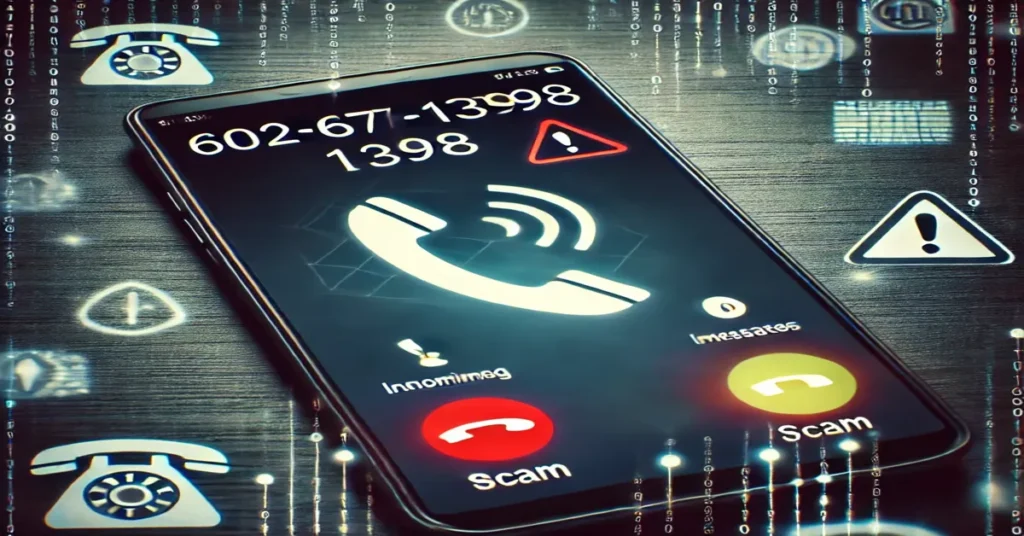In recent years, people all over the world have become more familiar with receiving unwanted or mysterious calls from numbers they don’t recognize. One such number, 602-671-3998, might have caught your attention if it appeared on your phone. But what does it signify, and should you be concerned about it?
In this article, we will delve into the world of unwanted calls, focusing specifically on numbers like 602-671-3998. We will explore topics such as the growing issue of spam and scam calls, the technology behind them, the dangers they pose, and how you can protect yourself from unwanted calls.
The Rise of Spam and Scam Calls
Spam and scam calls have exploded in recent years. According to a 2021 report by Truecaller, an app that identifies and blocks spam calls, U.S. consumers received an estimated 50.5 billion robocalls in 2020 alone. In the same year, the Federal Trade Commission (FTC) reported receiving over 2.8 million complaints about fraudulent calls. These numbers reflect the growing threat posed by unwanted phone calls, many of which are made using spoofed numbers like 602-671-3998.
The term “spam calls” refers to unsolicited phone calls that are typically made by telemarketers, political campaigns, or automated robocalls. On the other hand, “scam calls” are a more malicious subset, involving individuals or groups attempting to deceive you into providing personal information or money.
When you see a number like 602-671-3998 pop up on your phone, there are several possibilities for what type of call it might be. Let’s explore the different types of calls you could be dealing with:
1. Robocalls
Robocalls are automated phone calls that deliver a pre-recorded message, often on behalf of a company or organization. While some robocalls are legitimate—such as appointment reminders or emergency notifications—many are unwanted and serve as vehicles for scams.
Robocalls can range from legitimate marketing calls to illegal scams. Scam robocalls often claim to be from government agencies, such as the IRS or Social Security Administration, demanding immediate payment or threatening legal action if you don’t comply.
2. Telemarketing Calls
Another possibility is that 602-671-3998 belongs to a telemarketer. Telemarketing calls are made by companies to promote products or services. While telemarketing is legal, it can quickly become annoying, especially if you’ve already registered your phone number on the National Do Not Call Registry.
The difference between legal telemarketing calls and scam calls lies in the intention behind the call. Telemarketers want to sell you something, while scam callers are looking to steal from you.
3. Spoofed Calls
One of the most insidious tactics used by scammers is caller ID spoofing. Spoofing allows callers to change the number that appears on your phone’s caller ID, making it look as though the call is coming from a local or trusted number. This is particularly concerning because it can trick individuals into answering the call, thinking it’s from a legitimate source.
A number like 602-671-3998 could easily be spoofed to make it appear as though the call is coming from a local business or organization when, in reality, it’s from a scammer overseas.
4. Debt Collection Scams
Debt collection scams are another type of call that might originate from a number like 602-671-3998. In these scams, the caller pretends to be a debt collector, claiming that you owe money for a loan, credit card bill, or medical expense. These scammers often use aggressive tactics, threatening legal action or wage garnishment unless you make an immediate payment.
5. Phishing Scams
Phishing scams are designed to steal your personal information. A scammer might call from a number like 602-671-3998 pretending to be a bank or other financial institution. They may ask you to verify your account details, such as your credit card number, Social Security number, or PIN. Once they have this information, they can use it to commit identity theft or fraud.
How Do Spam and Scam Calls Work?
To understand how numbers like 602-671-3998 are used to make spam or scam calls, it’s essential to explore the underlying technology and tactics behind them.
1. Autodialers
An autodialer is a system that automatically dials phone numbers from a list. Autodialers are used by both legitimate businesses and scammers to quickly and efficiently make thousands of calls. Because autodialers can dial multiple numbers simultaneously, they’re an attractive tool for scammers looking to reach as many people as possible.
When you receive a call from 602-671-3998, it may have been placed by an autodialer. Once you answer, you might hear a pre-recorded message or be transferred to a live agent, depending on the nature of the call.
2. VoIP Technology
Many spam and scam calls are made using Voice over Internet Protocol (VoIP) technology. VoIP allows calls to be made over the internet rather than traditional phone lines. Because VoIP calls are cheaper and harder to trace, scammers use this technology to make thousands of calls without fear of being easily caught.
3. Caller ID Spoofing
As mentioned earlier, caller ID spoofing is a technique that allows scammers to disguise their real phone number. Using spoofing software, scammers can manipulate the caller ID to make it appear as though the call is coming from a local number, like 602-671-3998. This increases the likelihood that you’ll answer the call because it seems familiar or trustworthy.
Spoofing is illegal in many countries, including the United States, when used for fraudulent purposes. However, enforcing these laws can be challenging, especially when scammers are operating from overseas.
The Risks Associated with Spam and Scam Calls
Receiving a call from 602-671-3998 or similar numbers may not seem like a big deal at first, but there are several risks associated with answering unwanted calls. Some of the most common risks include:
1. Financial Loss
One of the primary goals of scam calls is to steal money. Scammers might ask for payment via wire transfer, prepaid gift cards, or even cryptocurrency, making it difficult to track or reverse the transaction. According to the FTC, consumers lost $3.3 billion to phone scams in 2020 alone, highlighting the serious financial risk posed by answering unknown calls.
2. Identity Theft
Another significant risk is identity theft. If a scammer successfully tricks you into providing personal information, such as your Social Security number, credit card details, or passwords, they can use that information to open fraudulent accounts, make unauthorized purchases, or even apply for loans in your name.
3. Phishing Attacks
As mentioned earlier, phishing attacks are designed to steal sensitive information. Scammers may pose as representatives from legitimate organizations, such as banks or government agencies, to convince you to share personal details. Once they have this information, they can commit fraud or sell your data on the dark web.
4. Fraudulent Charges
Some scam calls may involve tactics to place fraudulent charges on your phone bill. This is known as cramming, and it involves scammers signing you up for services you didn’t request, such as premium text messaging or long-distance calling plans. These charges can be difficult to detect unless you carefully review your phone bill each month.
5. Emotional Distress
In addition to financial risks, unwanted calls can cause emotional distress, particularly for vulnerable individuals. Scammers often use fear tactics, such as threatening legal action or imprisonment, to pressure people into complying with their demands. This can lead to feelings of anxiety, fear, and helplessness, especially for those who are unfamiliar with how scam calls work.
How to Protect Yourself from Unwanted Calls
Given the risks associated with unwanted calls, it’s essential to know how to protect yourself from numbers like 602-671-3998. Here are some steps you can take to reduce your risk of falling victim to spam and scam calls:
1. Don’t Answer Unknown Numbers
One of the simplest ways to protect yourself is to avoid answering calls from numbers you don’t recognize. If the call is important, the caller will likely leave a voicemail. By ignoring calls from unknown numbers, you reduce the risk of engaging with scammers or falling victim to fraud.
2. Use Call-Blocking Apps
There are several apps available that can help you block unwanted calls and robocalls. Apps like Truecaller, Hiya, and Nomorobo can identify spam numbers and block them before they reach your phone. Many of these apps also allow you to report scam numbers, helping to protect others from similar calls.
3. Register on the National Do Not Call Registry
In the United States, you can register your phone number on the National Do Not Call Registry to reduce the number of telemarketing calls you receive. While this won’t eliminate all unwanted calls, it can significantly reduce the number of legitimate telemarketing calls.
Keep in mind that scammers and criminals may still call your number, even if it’s registered on the Do Not Call list. However, being on the list makes it easier to identify illegal telemarketing calls and report them to the authorities.
4. Don’t Share Personal Information
Never provide personal information, such as your Social Security number, credit card details, or passwords, over the phone unless you’re sure the caller is legitimate. If you receive a call claiming to be from your bank, utility company, or a government agency, hang up and call the official number listed on their website to verify the call.
5. Report Unwanted Calls
If you receive a spam or scam call, report it to the Federal Trade Commission (FTC) or your country’s equivalent consumer protection agency. Reporting unwanted calls helps authorities track scam trends and take action against scammers. You can also report spoofed numbers to your phone carrier, which may help block future calls from the same number.
6. Enable Call Blocking on Your Phone
Most smartphones have built-in call-blocking features that allow you to block specific numbers or unknown callers. You can enable these features in your phone’s settings, reducing the likelihood of receiving unwanted calls from numbers like 602-671-3998.
7. Be Cautious of Caller ID
Just because a number looks legitimate on your caller ID doesn’t mean the call is safe. Scammers often use spoofing techniques to make their calls appear as though they’re coming from a local or trusted number. If you’re unsure about a call, hang up and contact the organization directly using a number you know is legitimate.
What to Do If You’ve Been Scammed
If you believe you’ve fallen victim to a phone scam, there are several steps you can take to protect yourself and mitigate the damage:
1. Contact Your Bank
If you provided financial information to a scammer, contact your bank or credit card company immediately to report the fraud. They may be able to freeze your accounts, reverse unauthorized charges, or issue a new card.
2. Monitor Your Credit Report
After falling victim to a phone scam, it’s crucial to monitor your credit report for any signs of identity theft. You can request a free credit report from the three major credit bureaus—Equifax, Experian, and TransUnion—and review it for any suspicious activity.
3. Place a Fraud Alert
You can also place a fraud alert on your credit report, which notifies potential lenders that your personal information may have been compromised. This can make it more difficult for scammers to open new accounts in your name.
4. File a Report with the FTC
If you’ve been scammed, file a report with the Federal Trade Commission (FTC) or your country’s equivalent consumer protection agency. The FTC tracks complaints and uses the information to take legal action against scammers.
5. Change Your Passwords
If you provided login information during the scam call, change your passwords immediately. This is especially important for your email accounts, online banking, and any other sensitive accounts.
Conclusion: Protecting Yourself from Unwanted Calls
Receiving a call from 602-671-3998 or any other unknown number can be a frustrating and potentially dangerous experience. With the rise of robocalls, telemarketing, and phone scams, it’s more important than ever to protect yourself from unwanted calls. By following the steps outlined in this article—such as not answering unknown numbers, using call-blocking apps, and reporting unwanted calls—you can reduce your risk of falling victim to scams and keep your personal information safe.
As phone scams continue to evolve, it’s crucial to stay informed and vigilant. While technology can help block many unwanted calls, scammers are constantly finding new ways to bypass these safeguards. By understanding the tactics they use and knowing how to protect yourself, you can stay one step ahead and protect your financial and personal well-being.







